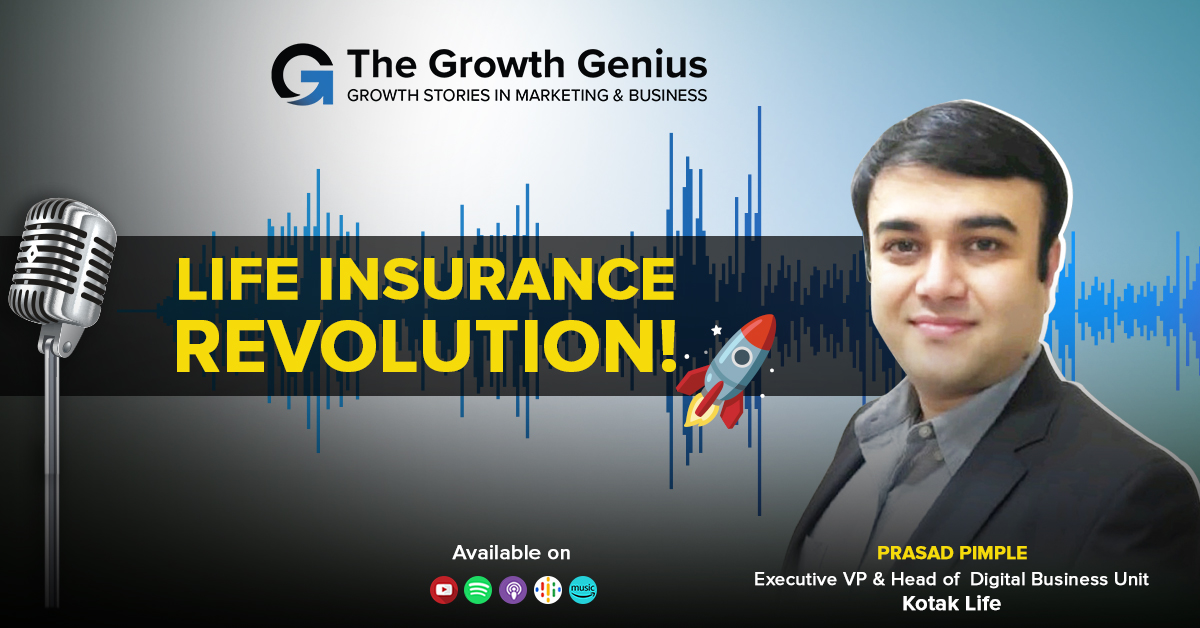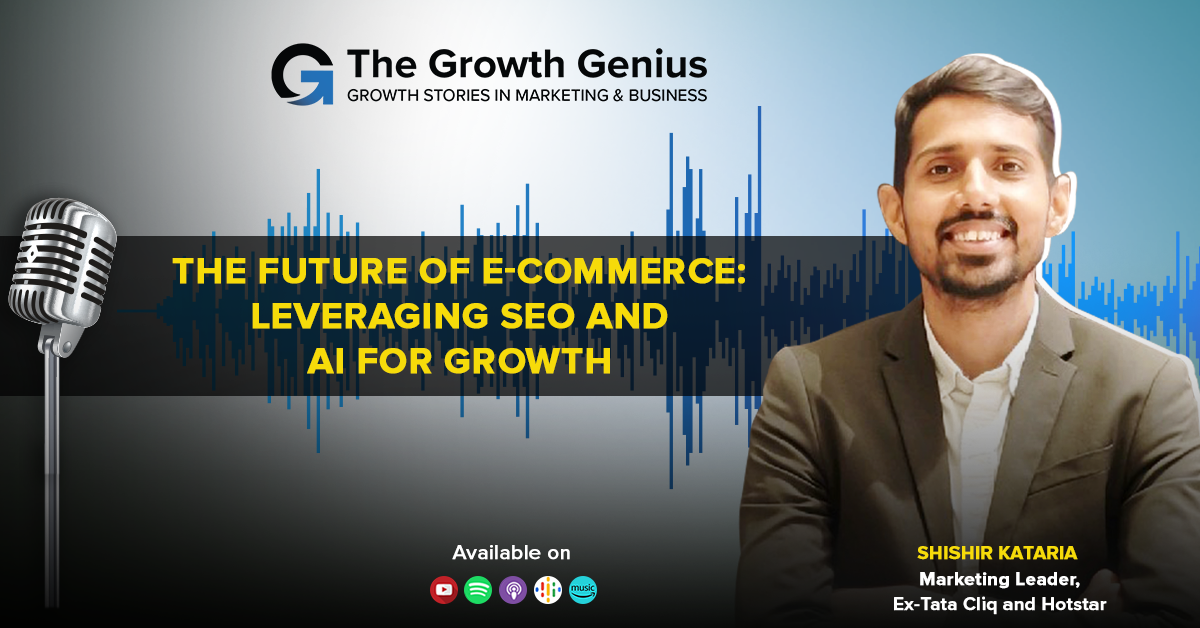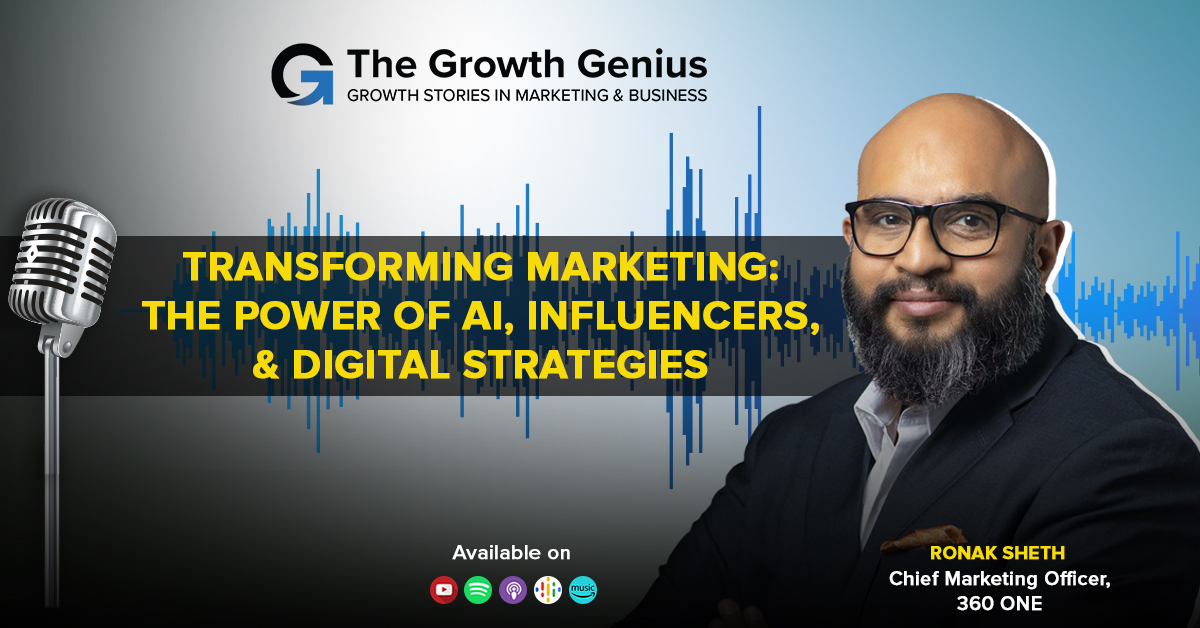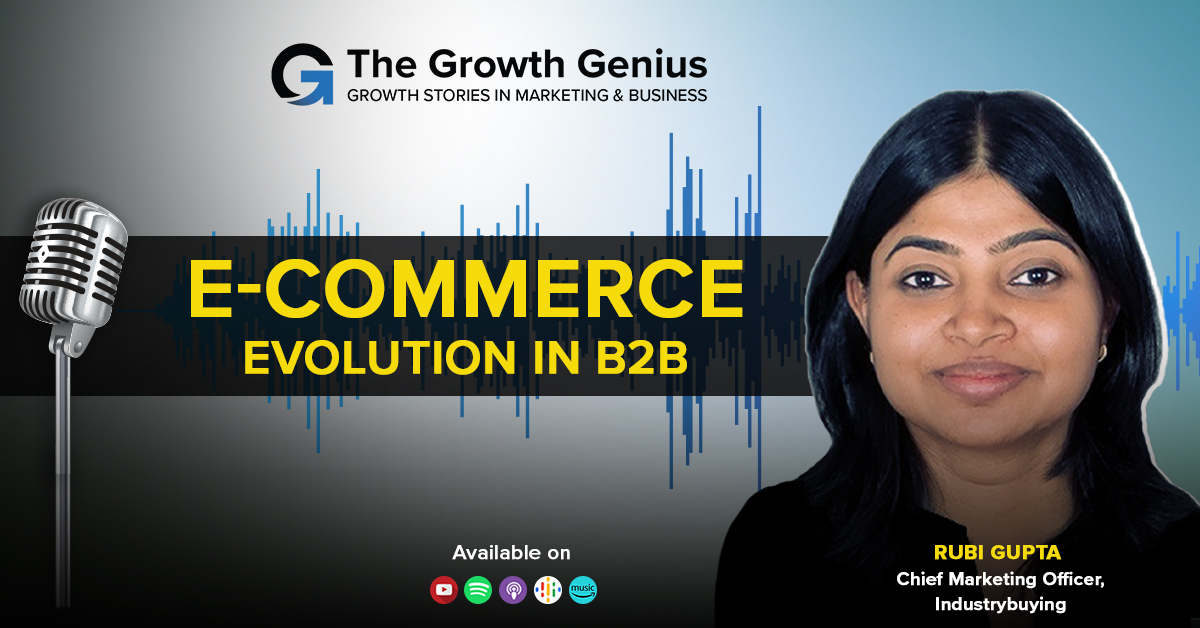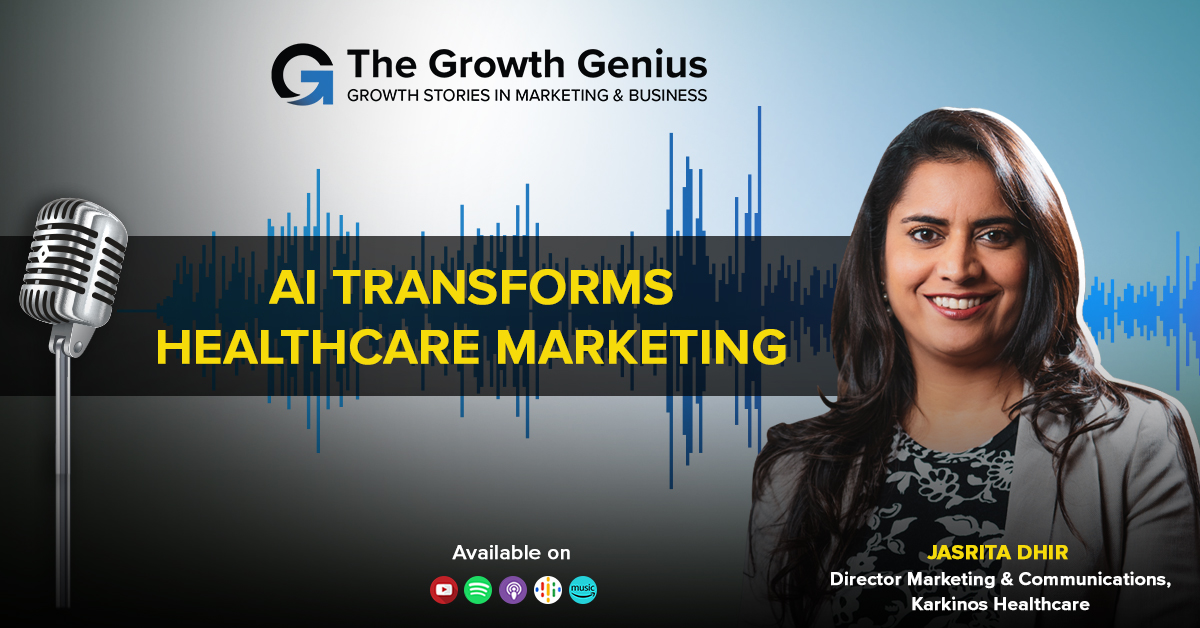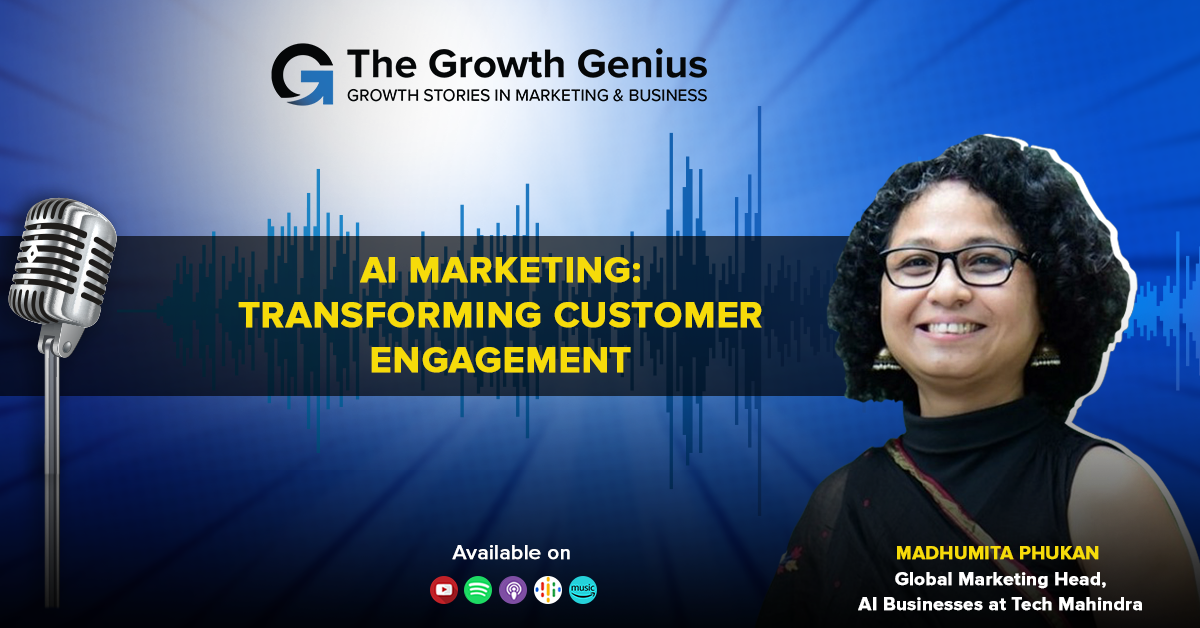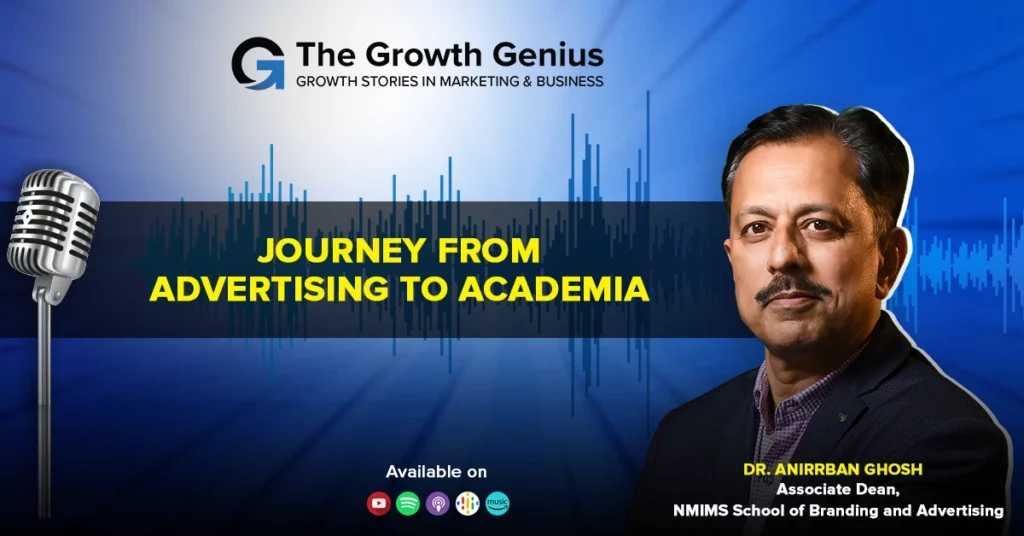
Witness an Increase in your ROI
Unlock higher rankings, quality traffic, and amplified conversions through tailored award-winning SEO strategies.
Listen on your Podcast app
Summary
Discover insightful strategies for effective advertising and branding through Dr. Anirvan Ghosh’s expertise. Gain valuable insights into optimizing your brand’s presence and enhancing advertising efforts. This comprehensive resource delves into key aspects of successful brand building and advertising techniques. Explore innovative approaches to create a compelling brand identity while maximizing advertising reach. Dr. Anirvan Ghosh shares invaluable guidance on harnessing the power of branding to captivate your target audience and boost engagement. Uncover the art of strategic advertising campaigns that align with your brand’s message and resonate with consumers. Elevate your advertising and branding endeavors using expert insights from this resourceful piece.
Key Take Aways
- Consistent Brand Identity: Maintain a consistent brand identity across all marketing channels and touchpoints to create a cohesive and recognizable brand image.
- Storytelling Power: Utilize the art of storytelling to connect emotionally with your audience, making your brand more relatable and memorable.
- Audience-Centric Approach: Tailor your branding and advertising strategies to address the specific needs, desires, and pain points of your target audience.
- Omni-channel Presence: Implement an omni-channel approach to reach your audience across various platforms and provide a seamless brand experience.
- Innovative Advertising Techniques: Experiment with creative and innovative advertising techniques to capture your audience’s attention and stand out from competitors.
- Value Proposition Communication: Clearly communicate your brand’s unique value proposition in all advertising efforts, highlighting what sets you apart in the market.
- Data-Driven Insights: Leverage data and analytics to measure the effectiveness of your branding and advertising campaigns, allowing for informed decision-making.
- Adaptation and Evolution: Stay agile and willing to adapt your branding and advertising strategies as market trends, consumer preferences, and technology evolve.
Read Transcript
Mehul Ashar:- Ladies and gentlemen welcome to yet another episode of the growth genius powered by infidelity. In today’s episode, we have a growth genius whose career spans across decades. He is a multifaceted personality who, in his own words, is an advertiser by heart, who has worked with various brands both nationally and internationally. He’s an entrepreneur, and currently, he’s an academician as well, heading one of the leading b schools in the country. So join me in welcoming Dr. Anirvan Ghosh.
Dr. Anirvan Ghosh:- Thank you, Mr. Mehul.Thank you.
Mehul:- Dr. Ghosh. You are the associate dean at NMIMS School of Branding and Advertising. We would like to know more about your role, if you can elaborate on that, please?
Dr. Ghosh:- So Mehul thank you. Firstly, see, I have been associated with this school since day one in 2019 when this school started. Okay? So I have been a part of the curriculum team, the academic council team, and the board of studies team, and I was also teaching a few of the subjects in this school and working there as a professor. Now, this is my second stint with NMIMS, wherein I have joined as an associate dean. Now I’m heading this school, taking it ahead to the next level, keeping in mind the different deliverables in terms of how students can be industry ready, what the ways and means of teaching-learning methods you need to adopt in terms of digital, in terms of AI, in terms of chat, GPTs and all that. So my task is different in terms of what I used to handle earlier. So currently, our course curriculum, our structure, everything we have defined in terms of how we can make it as an industry-ready student.
Mehul:- So, very interesting in terms of the role encompasses not just getting the students, but also making them industry ready, which is the need of the hour today as far as education is concerned?
Dr. Ghosh:- Very important, because nowadays all the institutions, for example, our school specialize in branding and advertising. If you talk about a client or if you talk about an agency, there is not much time for you to learn. Once you get into a job, the client or the agencies expect you to learn in the shortest possible period and get on with it. So basics, I don’t think anyone is going to teach you. You are expected to know the basics and of course, the strategy part and the other business acumen part. You will learn as and when you work and grow. So our main job here is to make the students industry ready with the basics very clear so that they can start from day one, wherever they’ll work.
Mehul:- Right? And how do you manage the aspirations of these youngsters when they get admitted to the school? Looking at their perspective on education today?
Dr. Ghosh:- Our course curriculum, as I said earlier, that it’s very different. Our course curriculums are not bookish course curricula, which other schools firstly BBA in branding and advertising. I don’t think any other school offers other than our school in India. So our course curriculum is also very different. The way we have curated it is more application-based, very radical course curriculums. We have in many cases where our courses are taught purely in a computer lab, right? For example, video editing, the filmmaking are all taught in computer labs and studios. Coming back to our faculties, we all have industry experts, at least 15 years plus experienced industry experts who come and teach. So students get a complete overview in terms of what is currently happening in the industry. They also get a chance to work on the live project, they also get a chance to visit the industry bodies, visit industry houses, visit different agencies, go there, spend a day to understand how the industry, how the agency functions. We actually have a course in the 6th semester, which is the last semester, where we have a course which is life in an advertising agency. So where we take the students to an advertising agency, let them meet the vertical heads and understand how an advertising agency functions, how do they handle the client, what is the kind of brief that do they get? How do they decode those briefs, who all work on these briefs? And then again they collate it in a proper format and then they go for pitching. So everything we teach them through the industry experts. So these are the unique things which we do. And of course, master class workshops are again conducted by the industry stalwarts. We invite them for the master class and workshops and these are the things which always motivates our students, keep them always motivated and always in terms of something or the other. We have got about 15 clubs in our school. So all these 15 clubs are very, very active in terms of we have our own podcast also we invite industry experts to talk about different issues, social issues, different professional issues in that podcast. Now, all those podcasts, the clubs, everything is created by the student and managed by the student as a faculty, as a head of the school, I don’t interfere into that. It is all created by them. So this is how we train them and we mold them so that they can become industry ready at the end of 6th semester and get placed in good advertising agencies and clients, of course.
Mehul:- So that also actually talks about how education is evolving per se, less and less of just theory and tilting more towards actual industry experience, experiencing the slice of life, if I may, at advertising agencies, which actually makes it more interesting?
Dr. Ghosh:- Absolutely. As I said, most of the courses are very differently application based courses. These course curriculums created are very application based, like, as I said, video editing, filmmaking, business communications, those are all courses which are taught in the computer labs and studios. So out of 180% is practical classes and 20% is only theory.
Mehul:- That’s quite a shift from what we have seen earlier?
Dr. Ghosh:- Industry experts. For example, for event management, we have the top of the league of those event management like Wizcraft. Those are the people coming and teaching our students. They are the people who are coming and telling our students how you can manage live events, what are the different modalities, permutations and combinations, benefits and disadvantages, challenges, all that kind of stuff. Media planning and buying. I have got one of the best of the faculties, best of the person in advertising industry you must be knowing. His name is Mr. Sandeep Nagpal. He’s got a company called Strategy Media. He’s been there for ages. I mean, he taught us media planning. Okay, so he comes and takes master classes and workshops for our students. So these are I just know two, three of them. So for almost all courses we have got industry scholars coming and taking master classes, workshops and of course our course curriculums are very different. As I said, it’s purely application based.
Mehul:- Dr. Ghosh, I am tempted to ask one more question since I am also learning a lot from what you are saying. As far as an academician is concerned. What are the few things that you are learning from your students who are now blooming into budding marketeers?
Dr. Ghosh:- So see marketing, if you see, has changed a lot from traditional to digital. Currently, I can tell you that the students are much more informed. They are much more intelligent and smart. So in the classroom, as far as the teachings are concerned, we need to teach them something which they cannot find in Google and Chat GPT, right? So it has become a very challenging task for the faculties as well. Earlier faculties could prepare normally and go and take a class. Nowadays you can’t you have to know something more than what a student can find out from Google or from Chat GPT. So a faculty really needs to be in the industry. They really need to know what is happening in the industry. They have to be in touch with the industry people. They need to know what are the latest software technologies are applied in the industry, how the media planning, buying, client, servicing, the product development, the principles of marketing, management has changed, keeping the AI, Chat GPT and all the technological advances in mind. So it has become a huge task for the faculties as well. And we encourage our faculties to be in touch with the industry experts. That is the reason we have got about 50. 50% of our subjects are taught by our core faculties and almost 50% subjects are taught by the industry experts.
Mehul:- That is probably a new way of creating a brand in education, which probably what NMIMS is doing of creating a gold standard in terms of new age education, so to speak?
Dr. Ghosh:- Yeah, it’s very important for you to teach application based stuff because as I said, outside world is very very competitive. We tell our students that you need to know your basics very clearly and at the same time you also need to know how you can utilize these basics keeping the current technology and current scenario in mind. So it is a huge task for the students as well and it is our job to teach them how to do it at least basics. We make it very clear so they are absolutely industry ready when they pass out from our school of branding and advertising.
Mehul:- That’s very interesting. And in today’s digital age, how do you reach out to these students for admissions? Like, do you also use social media marketing or how is the process like?
Dr. Ghosh:- Of course. So in today’s digital media it has become pretty easy for us to reach out to the students, prospective students, their parents and give them all the information they need without they coming personally to our campus or without they even calling us up and speaking to us for a long time. So we have a robust marketing team who reaches out to the prospective students and parents and give them all the information through the social media channels. We cater to all the social media channels, YouTubes and many other ways of social media we follow and then we take the help of that and then we inform and educate the prospective students and parents for the admission purposes. Yes and obviously after that there are counseling sessions, are there, we go outreach programs as well. Personally we go out to different schools, different institutions for admission purposes. But yes, digital media is definitely one of our main key channels through which we inform our prospective students and parents for the admission information.
Mehul:- That’s very smart way of reaching them and then also speaking to the parents at the same time and then bringing them to offline platforms?
Dr. Ghosh:- Nowadays students and parents both I feel decide sit down together and decide which college they want to take an admission and pursue their career. So it is very important for us to reach out not only to the students or not only to the parents, to both basically. So social media definitely plays a very important role for us to reach out to both of them, the parents as well.
Mehul:- Wonderful and just extending my question, what do you think about the role of influencers in today’s world of social media?
Dr. Ghosh:- See influencers for us in education sector. What we do is we definitely take help of our albany. We definitely take the help of our faculty members, the well known industry faculties who come to our institute and teach, as I said a couple of minutes back, that we believe in application based curriculum and hence we have all the industry experts coming in. So we take help of the industry experts to talk about our institute, to talk about our school, to talk about our pedagogy, our teaching learning methods and of course the alumni also, they do come and speak about our school. They do come and talk about on their social media pages, we tag them and they speak about our school where they have already studied for three years. So yes, for us that is the influencer basically use for our admission purposes.
Mehul:- That’s interesting. So we can safely say that influencers and micro influencers are here to stay. And it depends how you define them and utilize them for your smart surveillance?
Dr. Ghosh:- Definitely increase your brand awareness. So that is 1 second, authenticity and trust for the prospective students and parents. That is very important. For the authenticity and the trust, then the best way to reach out to the prospective parents and the students is because education is a very serious thing. So the more our alumni talk or our faculty talks is the better. Right? So that’s what we use. It’s a foolproof user generated content. That’s what we believe in.
Mehul:- So now, since you mentioned user generated content, in fact, my next question is about that and I know we have spoken about this offline also. What do you feel about the role of AI and how do you tackle it when you have students using AI for various content generation?
Dr. Ghosh:- If you’re talking about as far as the teaching learning methods are concerned, we definitely encourage students to use AI. We teach them AI, we definitely encourage them to use AI, but in a limited form that we teach them. It definitely helps in terms of automation and efficiency. It definitely also helps them to personalize and customize their projects, their assignments. It also helps them in terms of the problem solving, decision making process, so different ways and if they’re doing particular project or an assignment, of course they can take help of an AI for the improving accuracy, some kind of precision validation for all that. We definitely encourage our students to use AI and I’m sure all across we are already using AI and that’s what we want our students to do. As I mentioned a couple of minutes back that we want our students to become industry ready, right? So they need to know how to use AI so that when they get into the job so they’ll be easily able to use the relevant AIS to optimize their work. Right? So that’s what we do.
Mehul:- That’s probably a good approach of actually embracing the change rather than fighting it and utilizing it for developing the students. That’s great. So, looking at a broader perspective, dr. Ghosh, I would like you to tell us about your transition across your career from advertising, working with FMCG companies and then getting into academics. So how has it been?
Dr. Ghosh:- It’s a long 30 years of my journey. I started advertising in 1992 after I completed my MBA. So I started off with ABP group for about ten years, working with ABP India. Today and from Mark. Then I moved to radio. I have worked with Big FM and then I went on the other side of the table, which is the advertising agencies. So I worked with Percept and where I met you. And then I worked for a number of years with Madison, very closely with Mr. Balsara and the team, everybody. So all throughout I was in Mumbai and then after Madison, then the digital straint happened. For a couple of years I worked with Media to win that’s a digital marketing company. And then in 2012 I started my own company called Brand First, which is an activation and digital marketing company, particularly contest loyalty programs and digital marketing. So I started up with one client and now we are doing pretty well becoming an entrepreneur from 2012. Now, all this, what I told you is about my professional career, but simultaneously my academia started in 2006 when I started doing visiting faculty, working, visiting faculty as teaching media planning, buying media management, consumer behavior. So way back in 2006 I started my academia career. That’s about 16-17 years of academia also. So it’s a vast, diverse industry, working from the other side, from the media side of the table and then coming back to the agency side. And then when I started as an entrepreneur, I handled brands also. Now brands across all brands, you can say like the Mondeleys, almost all brands, britannia, almost all brands, nestle, almost all brands. There are a couple of brands which I handled like Rice, Hershey’s, General, Mail, when I was started as an entrepreneur, handling their contest loyalty programs. If you remember in 2019, Britannia, how World Cup job, one of the biggest contest program that was handled by my company entirely. So it has been very enriching and very learning experience for me since 1992, for all 30 years right now. So I’m here today completely into academia right now. In between, I had to do my PhD also because of the academia, there’s a prerequisite. So I completed that also. And then currently I am fully into academia.
Mehul:- Wonderful. That’s quite a journey over the years, throughout this journey, how do you feel the role of marketing changing over the years? I mean, what is your take on, I would say the changes in the role of a marketer?
Dr. Ghosh:- Let me tell you, as far as marketing is concerned, there is a huge shift from traditional to digital. So we have seen over the last ten years how traditional marketing has now shifted to almost digital in terms of marketing strategies, in terms of the budgeting for the clients also, right? So that is one big change which I see. I have also seen changes. The marketing have also changed in terms of the data driven decision making because now we have all the data available with us. So obviously there are a lot of data driven decision making is happening in marketing because it is digital. Another change what I can see is the personalization is happening because again of digital and then customer centricity that is also happening because of the digital content marketing. It’s a huge role now. All the brands are hugely depending on the content marketing. So content marketing is playing a huge role in terms of the marketing here. Sometime back we discussed about the influencer marketing. Yes, they are one of the main pillar of marketing right now as far as the influencer marketings are concerned. And yes, experiential marketing was earlier also there, but now I think it has become more ROI driven, it has become more robust and it has become more objective driven, experiential marketing. So these are the four or five difference, major differences I see which has happened in the changes in marketing from about ten years back to now.
Mehul:- So almost from an analog marketer, one has to become a digital marketer and look at both?
Dr. Ghosh:- Traditional to digital data driven. You’re talking about customer centricity, you’re talking about content marketing, influencer marketing, we are talking about experiential marketing also in a very different level altogether.
Mehul:- Any particular instance throughout your career which comes on top of your mind, which probably will be an AHA moment for you or some growth story which actually comes on top of your mind right now, which you can share with us.
Dr. Ghosh:- Yeah, so what I wanted to tell you is that there are quite a few moments I had in my long career about where I felt very satisfied and I found that my career has taken a jump in terms of mental satisfaction and even otherwise as well. So one of the moment is that when I started off as an entrepreneur in 2012 and getting clients, I never thought that I’ll be getting MNCs, coming on board and working with us. The first client which I got an onboard was not an MNC of course, but it was a large client called Britannia. So I’m talking about 2019 when I got onboard Britannia for the Britannia Cow World Cup, your campaign, that was definitely a AHA moment for a very small team of us wherein we had to go and pitch there for about three days continuously. And I knew that I was in competition with big brands. So there are very limited number of contest loyalty program companies are there in India, but whoever is there in India was pretty big at that point in time, in 2019, they are pretty big in compared to us. But yes, that was one of the our moment where we could actually convey to the client that yes, this is what we deliver, this is what we’ll be able to do and exactly the robust objectives was followed and the deliverables was followed and that was one of the AHA moment for us gaining Britannia into our thing. Second, I must mention in academia, in academia there are many moments, I mean for a teacher the best moment is when a student acknowledges and when a student says that they like a particular faculty, that is one of the AHA moment for a faculty, right? So this happened in NMIMS when I was teaching the third year students in 2020. So when everybody came to my cabin one fine day and they’ve given me a big card pasting all the photographs in that card and videos and bookings and photographs, session after sessions, photographs and they told me that how they liked my teaching. They told me the way I teach them in terms of application based questions, answers, the workshops, the master classes, how they like me. And these are the things which are definitely an AHA moment. I still get messages from all my students across the world right now. Few of them are in Australia, a few of them are in US. I still get their messages not only for the academic purposes, but in other purposes also. Even if they are stuck in their personal life, they call up and ask what are the ways of getting out of that particular thing? So it’s definitely an AHA moment for me in terms of academia and in professional.
Mehul:- That is so touching.
Dr. Ghosh:- There are many Mehul. I just gave you only two.
Mehul:- Yeah, that is so touching know when you see all your students coming to you, every teacher wants know.
Dr. Ghosh:- Every teacher wants appreciation from students, genuine appreciation from students.
Mehul:- And also when you pitch to Britannia it is like David versus Goliath kind of a situation.
Dr. Ghosh:- I mean, I never thought that even Britannia would call me. But I got a call from the head of the marketing to come and pitch and that time we had an office in Mumbai only. So I got a call, I remember that in the evening at 06:00 and the head of the marketing asked me to come next day morning at 11:00. That’s the time. So either you be there or you lose out on the business. So for me, business was not important. For me, mental satisfaction was more important. At that point in time I wanted validation from a big client that yes, we are doing good and whatever we are doing is we are on the right track. So I wanted that kind of validation from a big client like Britannia. So more than getting a big client for money, I went with one of my colleagues the next day morning we booked our flight on the same day. The moment I received the call, the moment I disconnected the call at 6:30 in the evening, I booked the flight for the next day morning at 09:00. And then we reached at Britannia office, prestige Santini Ketan in Bangalore in the morning about 10:30. And then by the evening that campaign was handed over to us, it was absolute moment of joy for all of us. It’s a different satisfaction I had after working for so long. That kind of satisfaction I had got in the initial phases of my life. I don’t know if you remember when Tata Corporate changed their logo, it’s way back in I think 94, 95 if I’m not mistaken. That was a big campaign those days. There was no digital so Tata were planning for a big full page print campaign and I remember Ogilvy was handling that campaign at that point in time and the account manager was Sheetal Banerjee at that point in time in Ogilvy. Currently I am still in touch with Sheetal. He is the overall, I think worldwide of Phillips. He’s currently based in Netherlands. So he was the person we had gone and pitched. I was working at that point in time in Statesman and beating AVP Group and Ananda Bazaar Patrika and the Telegraph was a big task for me and it was a big campaign at those days in 94-95 getting about five full page campaign was a big deal. So that campaign winning was also AHA moment for us. For me till date I still remember that very well when she tell called up and told me the campaign is yours six or seven full page campaign. Tata corporate logo change. If you remember earlier there was a full circle of Tata’s black and white logo, right? Then they changed it to Archive kind of a logo which still holds. So that was an AHA moment still so these are the I have got many these are the couple of things which is still, you know,
Mehul:- Some amazing stories to hear actually and what would you say in terms of few learnings from your career which you would like to share with the viewers?
Dr. Ghosh:- So firstly you need to be thorough with your basics. Unless and until you do not know your basics you will not be able to improvise on that and unless and until you improvise you will become irrelevant to whichever industry you are in. So have your basics very very strong. Okay? Secondly, adapt yourself to the situation which is very important if someone is upskill yourself there are many currently in our days there never used to be upskilling stuff. So now there are a lot of upskilling opportunities are there? Utilize your free time for upskilling yourself. So that is another advice, I would like to give it to the youngsters that the basics should be very clear. Upskilling yourself in your free time should be very important and of course the knowledge based working and the industry ready, these are the kind of things one has to be very clear on this. So I think these are the two things basically. So the basics should be very clear and of course your upskilling, these are the two. From the personal perspective, if you’re talking about in terms of career growth then definitely one needs to be agile, one needs to have a clear and complete understanding of the domain where he or she is working the industry information very clearly what are the competitions are doing. You need to study very thoroughly. These are the things which basics which you need to do. Plus you need to understand your clients requirements very thoroughly. And I don’t want to use that word out of the box thinking, but yes, if you can do a little bit of an lateral thinking, something which nobody has done, you can only do it if you understand clients business very clearly. 1 second, if you understand industry where you’re working, that is number two. And number three, if you really want to grow in your career. So these are three things for professionally and earlier, two things I told you about personal growth, apart from being hardworking and honest. I didn’t say this because that is taken, right? That is given.
Mehul:- That is a given. Yes. There is no substitute for hard work.
Dr. Ghosh:- Yes, hard work and honesty.
Mehul:- True, very true. That’s wonderful. And Dr. Ghosh, I just wanted to touch upon a bit on the Britannia campaign that you ran. Any specific learnings in terms of when you executed the campaign? Anything? Because this was a big campaign across the country. Any specific learnings or any specific examples you would like to share from this campaign?
Dr. Ghosh:- So, firstly, I’ll explain. But let me tell you the foremost important thing, which I learned it once again after I got this Britannia and started handling it, that teamwork is one of the most important thing for growth of any company. So without teamwork, you cannot grow. A company cannot grow without teamwork. That is the first thing I must say. Now, coming back to the campaign, initially, when the campaign was given to me, it was for 60 days. I remember it was in 2019 April, when we ran this campaign, just before the World Cup. Just before 2019 World Cup. Because one of the prizes in that campaign was 100 tickets, world cup tickets. 100 World Cup tickets to the consumer. Whoever would participate in that, okay, they will be physically going to the stadium and watching the match. Now, initially it was given for two months. Now, imagine in this country, everybody is a cricket lovers, right? So imagine the kind of responses we started getting because it is Britannia. Everybody consumes Britannia products. It was heavily marketed digitally as well as traditionally. So we started initially getting about 50,000 to one lakh OD participants in a day. And it ended up to about three lakh participation in a day. Three lakh participation in a day, which also taught us how robust your tech system should be to run this kind of a campaign. And while at the end of the two months, the client was so happy and the response was so good that it was extended for one more month, so we went on to another month, which is 90 days of the campaign. So the learning was, again, as I said, you need to deliver what you have promised to the client. So always under promise to a client and over deliver. I have always been believing in that, that you under commit and then you deliver more than that. For that at the time of pitching one needs to know how to talk less than necessary. So generally now when I am in the other side of the table when I see agencies coming and pitching me, I see they speak lot of things which probably they don’t need to speak so speak less than necessary. That is the most important thing we have learned there and we delivered more than we had promised to our clients and absolutely seamlessly catering to three lakh consumers every day. We had a huge amount of number of call centers which was managed by two of my team members and tech team was about five six tech teams, ten OD customer services then three, four so total about 30 people managed that campaign. Let me also tell you this is that three months we did not sleep properly on those three months because our business is such that it’s 24x7like a television channel, it goes on 24×7. A consumer can participate in the contest at 02:00 in the night also and he should be able to participate seamlessly. So we worked in shifts, our technical team worked in shifts. So there we clearly understood that how teamwork is so important and so necessary. So your knowledge base has to be very good, your teamwork has to be very good. You need to know how much you have promised to the client. You should be delivering it more than what you have promised, right? So these are the fundamental things which came to know again while we handling that campaign.
Mehul:- That in fact also throws light on how you handle consumer experience. You said the tech team was ready 24×7.
Dr. Ghosh:- I had about 500 to 1500, OD queries because that campaign was such the mechanism was like you buy a Britannia biscuit pack and you SMS the code. That code was also created by us so that it cannot be duplicated. So you SMS that code and by that code you will get a point. So every code you send you get runs and every 100, 200, 300, 400, 500, which is maximum runs you score by buying that product and messaging us you get some prizes. So the milestone was created so it was a very massive complex campaign created and handling seamlessly addressing the consumer’s queries. We used to have about 1500 to 2000, OD queries every day because somewhere or the other the consumer used to get stuck and all. So we need to tell them that how to participate and even if they’re getting stuck we need to tell them how to roll back and start all over again. So yes, consumer handling of course. So that is one of the most important thing. We again learned that how to handle overall consumers the clients, the technical team, everything put together.
Mehul:- In that talking about consumer experience what are the two, three things that you feel are sacrosanct to ensure that you give a healthy consumer experience to the end user?
Dr. Ghosh:- So firstly the deliverables, the deliverables has to be very clear what you promise. You need to give exactly the same if not more. Okay? If you can give them the more then because we were handling a contest kind of campaign so we had to give what has been promised. We had to give what is written in that microsite. That okay. If you are a consumer, if you are purchasing one of the Britannia product you can participate in these manners. So that we had to make it sacrosanct for at least 90 days, 24×7. Okay? That is one part. Secondly, when we were having about 1500, 2000 complaints challenges from the consumers every day we had to keep our head cool. There are many consumers who would be very hyper and they would talk about their unsatisfaction in a very different manner. So we had to keep our head cool and solve resolve their problems. So it is very important that you keep your head cool, calm and resolve the foremost important objective to be resolve the consumer’s query, resolve the consumer problems and not avoiding their problems. Okay? So we used to first take all the complaints which are very very serious kind of a problem where the messaging is failing or they are not understanding. There are many consumers who called us saying that we don’t understand how this contest work. Can you tell us the contest entirely? So we had that kind of workstations also where we explained the entire contest methodology to them before even they participated, started participating. So all these we realized that consumer is the king of course and we could never default on that because on one side we had our client and on the other side we had the consumer of our client. Right? We are in the mediator in terms of serving to the client as well as to the consumers. So we had to be absolutely bang on for all the.
Mehul:- Yeah that’s interesting because you are representing the client at the end of the day so you need to deliver as know the brand that is running the campaign so you cannot falter at all in that. Dr. Ghosh, I also know that you have your own podcast as well and I do listen to that.
Dr. Ghosh:- Thank you so much.
Mehul:- And these are the tips that you actually give to people in terms of how to deal with certain life situations. So I find it very interesting.
Dr. Ghosh:- Thank you.
Mehul:- One thing which I would like to ask you is that you have been a multifaceted personality throughout your career. How do you manage your time and how do you keep yourself motivated in terms of pursuing such various interests?
Dr. Ghosh:- So the only one very simple thing is that discipline? Okay, so I wouldn’t say that every day I follow a particular routine. But yes, I do follow most of the time I do follow a routine. I have a set of things, set of plans which I do. I have a set of time during the day when I go through at least two, three newspapers early in the morning and prepare for my classes, then write research papers, which is absolutely mandatory for an academician. So we do write research papers for that research, reading the literature review, plus having your own time with your family. So all that, I can only tell you that you need to know your time very clearly. So time management happens only because you are disciplined enough to manage your time and you don’t allow one task to spill over to another time. So that is very, very important. So I follow a strict discipline and that’s how I maintain the time. And if you ask me, another point is that if you have that motivation or that fire in you to do something, as long as you are alive, I guess you get time, 24 hours I think is more than enough for anybody to do whatever I do. So these are the two things.
Mehul:- Amazing, these are two life lessons that one can always take from this podcast.
Dr. Ghosh:- Absolutely,
Mehul:- That’s wonderful. I mean, great insights Dr. Ghosh. And thank you so much for your insights, for your valuable lessons. I think these are some lessons which even I will carry forward and I’m sure our viewers will also like them. Thank you so much for this insightful session.
Dr. Ghosh:- Thank you. Thank you very much. Thank you so much.
Mehul:- So ladies and gentlemen, this was yet another episode of The Growth Genius powered by Infidigit, where we discussed growth stories of marketing and business with our Growth Genius, Dr. Anirban Ghosh. For more such growth stories, you can follow infidigit on various social media platforms like LinkedIn, Facebook, Twitter, Instagram and YouTube. You can also listen to this content on various audio streaming platforms like Spotify, Amazon and Apple. The links to all of these are mentioned in the description below. So till the next episode of The Growth Genius, take care and thank you very much.


